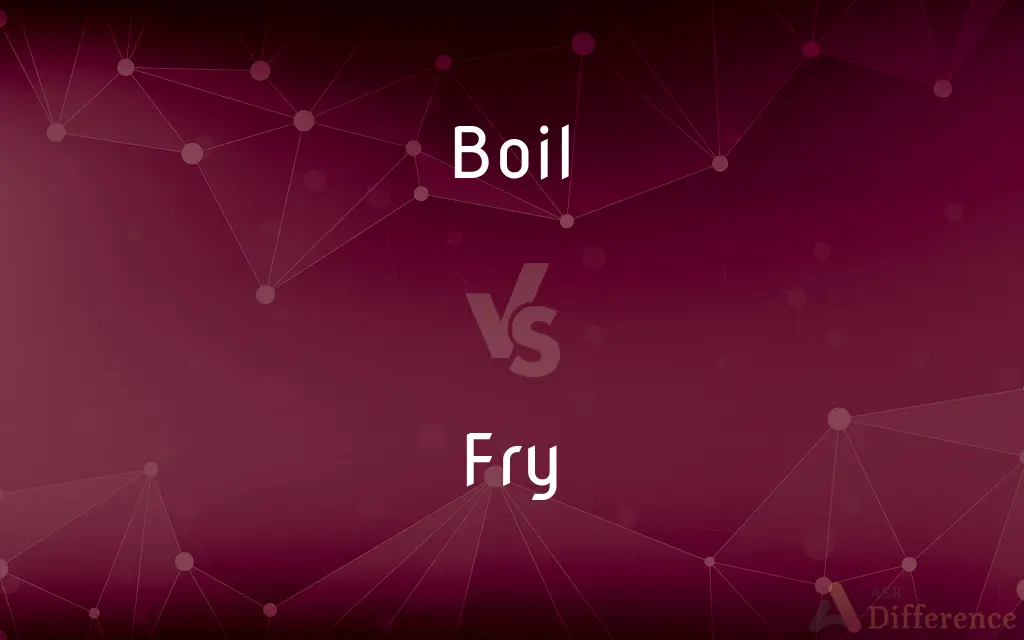Boil vs. Fry — What's the Difference?
Edited by Tayyaba Rehman — By Urooj Arif — Updated on April 15, 2024
Boiling involves cooking food by submerging it in water or another liquid at 100°C, primarily used for tenderizing; frying cooks food by immersing it in hot oil, enhancing flavor and texture.

Difference Between Boil and Fry
Table of Contents
ADVERTISEMENT
Key Differences
Boiling is a cooking method where food is submerged in a liquid (usually water) brought to a temperature of 100°C, causing the liquid to bubble and steam. Frying, on the other hand, involves cooking food by immersing it in hot fat or oil, typically ranging from 160°C to 190°C.
While boiling generally results in a moist, tender texture, it can sometimes lead to a loss of nutrients as they leach into the cooking water. Frying preserves the nutrients within the food but adds additional fat, making it richer and potentially higher in calories.
Foods suitable for boiling include pasta, eggs, and vegetables, which benefit from gentle, even heat. Conversely, foods like chicken, fish, and potatoes are often fried to achieve a crispy exterior and a flavorful, juicy interior.
The cooking times for boiling are usually longer than for frying. This is because the lower temperature of boiling takes more time to cook the food thoroughly. Frying, meanwhile, uses high heat to cook foods quickly and add a distinctive browned and crispy surface.
The equipment used also differs significantly; boiling requires a pot and sufficient water to cover the food, whereas frying typically involves a fryer or a skillet with a significant amount of oil.
ADVERTISEMENT
Comparison Chart
Temperature
100°C (212°F)
160°C to 190°C (320°F to 374°F)
Cooking Medium
Water or other liquids
Oil or fat
Typical Foods
Pasta, eggs, vegetables
Chicken, fish, potatoes
Nutrient Retention
Lower due to leaching
Higher, but increases fat content
Texture Outcome
Soft and moist
Crispy and browned
Compare with Definitions
Boil
A method to make food tender using water or broth.
She likes to boil chicken before adding it to salads.
Fry
Typically used for achieving a crispy and golden exterior.
Fry the potatoes until they are thoroughly crisp.
Boil
A rapid bubbling of water caused by heat.
Wait for the water to boil before adding the pasta.
Fry
To cook something quickly over high heat with oil.
Fry the onions until they are golden brown.
Boil
Cooking food by heating it in a liquid at boiling point.
I decided to boil the potatoes for dinner.
Fry
Cooking food in hot oil or fat.
He decided to fry the fish for a crispy skin.
Boil
Used to sterilize or clean objects by immersing in hot water.
Boil the baby bottles to ensure they are germ-free.
Fry
Associated with quick, high-heat cooking.
She can fry up a breakfast in no time.
Boil
A situation or emotional state about to erupt.
His anger was on the boil during the meeting.
Fry
A method that imparts a rich flavor and texture.
Fry the spices briefly to release their aromas.
Boil
(with reference to a liquid) reach or cause to reach the temperature at which it bubbles and turns to vapour
We asked people to boil their drinking water
He waited for the water to boil
Fry
To cook over direct heat in hot oil or fat.
Boil
(with reference to food) cook or be cooked by immersing in boiling water or stock
Make the sauce while the lobsters are boiling
Boil the potatoes until well done
Fry
(Slang) To destroy (electronic circuitry) with excessive heat or current
"a power surge to the computer that fried a number of sensitive electronic components" (Erik Sandberg-Diment).
Boil
(of the sea or clouds) be turbulent and stormy
A huge cliff with the black sea boiling below
Fry
To be cooked in a pan over direct heat in hot oil or fat.
Boil
The temperature at which a liquid bubbles and turns to vapour
Bring the sauce to the boil and simmer for 10 minutes
Fry
(Slang) To undergo execution in an electric chair.
Boil
A casual outdoor meal at which shellfish is prepared by boiling
The reappearance of warm days signals another revival: weekend crawfish boils
Fry
A french fry
Ordered fries as a side dish.
Boil
An inflamed pus-filled swelling on the skin, caused typically by the infection of a hair follicle.
Fry
A dish of a fried food.
Boil
To change from a liquid to a vapor by the application of heat
All the water boiled away and left the kettle dry.
Fry
A social gathering at which food is fried and eaten
A fish fry.
Boil
To reach the boiling point.
Fry
A recently hatched fish.
Boil
To undergo the action of boiling, especially in being cooked.
Fry
A young salmon living in fresh water that is older than an alevin and younger than a parr or smolt.
Boil
To be in a state of agitation; seethe
A river boiling over the rocks.
Fry
A young animal of certain other groups, such as frogs.
Boil
To be stirred up or greatly excited, especially in anger
The mere idea made me boil.
Fry
Pl. fry or fries An individual, especially a young or insignificant person
"These pampered public school boys ... had managed to evade the long prison sentences that lesser fry were serving" (Noel Annan).
Boil
To vaporize (a liquid) by the application of heat.
Fry
A method of cooking food.
Boil
To heat to the boiling point.
Fry
(transitive) To cook (something) in hot fat.
I am frying the eggs.
Boil
To cook or clean by boiling.
Fry
(intransitive) To cook in hot fat.
The eggs are frying.
Boil
To separate by evaporation in the process of boiling
Boil the maple sap.
Fry
(obsolete) to simmer; to boil
Boil
The condition or act of boiling.
Fry
To be affected by extreme heat or current.
Boil
Lower Southern US A picnic featuring shrimp, crab, or crayfish boiled in large pots with spices, and then shelled and eaten by hand.
Fry
To suffer because of too much heat.
You'll fry if you go out in this sun with no sunblock on.
Boil
An agitated, swirling, roiling mass of liquid
"Those tumbling boils show a dissolving bar and a changing channel there" (Mark Twain).
Fry
To be executed by the electric chair. Category:en:Capital punishment
He's guilty of murder — he's going to fry.
Boil
A painful, circumscribed pus-filled inflammation of the skin and subcutaneous tissue usually caused by a local staphylococcal infection. Also called furuncle.
Fry
To destroy (something, usually electronic) with excessive heat, voltage, or current.
If you apply that much voltage, you'll fry the resistor.
Boil
A localized accumulation of pus in the skin, resulting from infection.
Fry
A fried piece of cut potato.
Boil
The point at which fluid begins to change to a vapour; the boiling point.
Add the noodles when the water comes to the boil.
Fry
A meal of fried sausages, bacon, eggs, etc.
Boil
A dish of boiled food, especially based on seafood.
Fry
The liver of a lamb.
Boil
The collective noun for a group of hawks.
Fry
A lamb or calf testicle.
Boil
A bubbling.
Fry
A state of excitement.
To be in a fry
Boil
To heat to the point where it begins to turn into a gas.
Boil some water in a pan.
Fry
Young fish; fishlings.
Boil
(ambitransitive) To cook in boiling water.
Boil the eggs for three minutes.
Is the rice boiling yet?
Fry
Offspring; progeny; children; brood.
Boil
To begin to turn into a gas, seethe.
Pure water boils at 100 degrees Celsius.
Fry
(archaic) A swarm, especially of something small.
A fry of children
Boil
To bring to a boil, to heat so as to cause the contents to boil.
Fry
The spawn of frogs.
Boil
To be uncomfortably hot.
It’s boiling outside!
Fry
A kind of sieve.
Boil
To feel uncomfortably hot.
I’m boiling in here – could you open the window?
Fry
A drain.
Boil
(transitive) To form, or separate, by boiling or evaporation.
To boil sugar or salt
Fry
To cook in a pan or on a griddle (esp. with the use of fat, butter, or olive oil) by heating over a fire; to cook in boiling lard or fat; as, to fry fish; to fry doughnuts.
Boil
(obsolete) To steep or soak in warm water.
Fry
To undergo the process of frying; to be subject to the action of heat in a frying pan, or on a griddle, or in a kettle of hot fat.
Boil
To be agitated like boiling water; to bubble; to effervesce.
The boiling waves of the sea
Fry
To simmer; to boil.
With crackling flames a caldron fries.
The frothy billows fry.
Boil
To be agitated, or tumultuously moved, as a liquid by the generation and rising of bubbles of steam (or vapor), or of currents produced by heating it to the boiling point; to be in a state of ebullition; as, the water boils.
Fry
To undergo or cause a disturbing action accompanied with a sensation of heat.
To keep the oil from frying in the stomach.
Boil
To be agitated like boiling water, by any other cause than heat; to bubble; to effervesce; as, the boiling waves.
He maketh the deep to boil like a pot.
Fry
A dish of anything fried.
Boil
To pass from a liquid to an aëriform state or vapor when heated; as, the water boils away.
Fry
A state of excitement; as, to be in a fry.
Boil
To be in boiling water, as in cooking; as, the potatoes are boiling.
Fry
The young of any fish.
Boil
To heat to the boiling point, or so as to cause ebullition; as, to boil water.
Fry
A swarm or crowd, especially of little fishes; young or small things in general.
The fry of children young.
To sever . . . the good fish from the other fry.
We have burned two frigates, and a hundred and twenty small fry.
Boil
To form, or separate, by boiling or evaporation; as, to boil sugar or salt.
Fry
English painter and art critic (1866-1934)
Boil
To subject to the action of heat in a boiling liquid so as to produce some specific effect, as cooking, cleansing, etc.; as, to boil meat; to boil clothes.
The stomach cook is for the hall,And boileth meate for them all.
Fry
English dramatist noted for his comic verse dramas (born 1907)
Boil
To steep or soak in warm water.
To try whether seeds be old or new, the sense can not inform; but if you boil them in water, the new seeds will sprout sooner.
Fry
Be excessively hot;
If the children stay out on the beach for another hour, they'll be fried
Boil
Act or state of boiling.
Fry
Cook on a hot surface using fat;
Fry the pancakes
Boil
A painful sore with a hard pus-filled core
Boil
The temperature at which a liquid boils at sea level;
The brought to water to a boil
Boil
Come to the boiling point and change from a liquid to vapor;
Water boils at 100 degrees Celsius
Boil
Cook in boiling liquid;
Boil potatoes
Boil
Bring to, or maintain at, the boiling point;
Boil this liquid until it evaporates
Boil
Be agitated;
The sea was churning in the storm
Boil
Be in an agitated emotional state;
The customer was seething with anger
Common Curiosities
Is frying healthier than boiling?
Frying can add significant calories and fats, whereas boiling may reduce calories but also nutrients.
How do I know when boiling water has reached the correct temperature?
Water at boiling point will bubble vigorously.
What is the main difference between boiling and frying?
Boiling uses water at 100°C to cook food, while frying uses oil at higher temperatures to cook and crisp food.
Which method is quicker?
Frying is generally quicker due to the higher temperatures involved.
Can boiling affect the taste of food?
Yes, boiling can sometimes dilute flavors unless seasonings are used effectively.
Do I need special equipment for frying?
Yes, a fryer or skillet suitable for high temperatures and safe use with oil is recommended.
Can I reuse frying oil?
Yes, but it should be strained and stored properly; however, it should not be reused indefinitely.
Is it necessary to boil food before frying it?
Pre-boiling can be useful for foods like potatoes to ensure even cooking and a crispy finish when fried.
Can all foods be boiled or fried?
Not all foods are suitable for both; boiling is good for tenderizing, while frying is better for crisping and flavor enhancement.
Is it possible to fry without oil?
Air frying is a popular method that uses minimal to no oil, relying on circulating hot air.
What safety precautions should I take while frying?
Use a thermometer to monitor oil temperature, and never leave hot oil unattended.
What types of oils are best for frying?
High smoke point oils like canola, vegetable, and peanut oil are ideal for frying.
Why does frying make food crispy?
The high heat of the oil dehydrates the outer layers of the food, creating a crispy texture.
What is the ideal temperature for frying?
Typically between 160°C to 190°C, depending on the food.
How does boiling help in food preparation?
It softens food, making it easier to digest and blend with other ingredients in recipes.
Share Your Discovery

Previous Comparison
Apogee vs. Pinnacle
Next Comparison
Nowt vs. OwtAuthor Spotlight
Written by
Urooj ArifUrooj is a skilled content writer at Ask Difference, known for her exceptional ability to simplify complex topics into engaging and informative content. With a passion for research and a flair for clear, concise writing, she consistently delivers articles that resonate with our diverse audience.
Edited by
Tayyaba RehmanTayyaba Rehman is a distinguished writer, currently serving as a primary contributor to askdifference.com. As a researcher in semantics and etymology, Tayyaba's passion for the complexity of languages and their distinctions has found a perfect home on the platform. Tayyaba delves into the intricacies of language, distinguishing between commonly confused words and phrases, thereby providing clarity for readers worldwide.















































